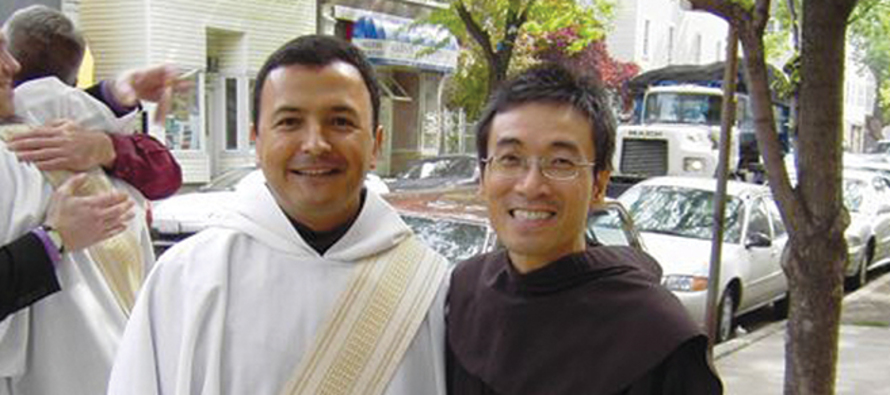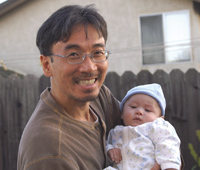How God tricked Duc Pham into becoming a brother

Image: BROTHER DUC Pham (at right), celebrates a milestone in the road toward priesthood for Juan Carlos Ruiz Guerrero, who is now an ordained member of the Franciscan order.
IT IS A SNOWY, bitter-cold morning—12 degrees above zero, not counting the wind chill. “I’ve been in the Chicago area about 10 years now, but you can never get used to this weather," says Duc Pham, a native of Vietnam. “But you just live with it."
Diminutive and obviously enthusiastic, Pham, a Franciscan brother, is director of the Franciscan Postulancy Program of the Sacred Heart Province at the St. John the Baptist Friary in the gritty city of Joliet, Illinois, 30 minutes southwest of downtown Chicago. It’s the first stage of the initial formation for a person interested in becoming a friar.
Spending a good part of the day with Duc Pham, one quickly becomes aware that this is one magnetic person, full of life—kind of an evangelical Energizer Bunny. Later, at lunch this particular day, Pham will assign the postulants various housekeeping chores, from organizing closets to solving plumbing issues. Earlier, he had held private conversations with the postulants, seeking to help them ascertain whether they have a true calling to the religious life. He himself became a Franciscan because, he laughingly tells a visitor, “I really didn’t shop around. Basically, God tricked me into it" (more about that later).
Asked how he discerns who has a calling and who doesn’t, he explains: “It’s a dialogue between the particular person, the staff, and community of friars here at St. John’s. We’re not really judging anybody. As friars, you must have community skills. You must be able to live with other people and to work out conflicts. You have to have the desire of going to prayer and to Mass every day. If you find that’s a difficulty for you, then probably this is not the way you should go.
“Some other issues would be competency in doing ministry. Are you able to serve? Are you able and willing to learn? Flexibility is also what we look for. But, mostly, it’s community. Because from fraternity, everything flows—our spirituality, mission, sense of prayer." He adds that the main mission of the Franciscans is helping the poor. “That’s very important in our spirituality and identity. Our hearts are with those who are powerless, on the margin, just because of the story of Francis.
“In this first stage, we help the guys discover themselves through either workshops or doing ministry. The focus is to answer the question, ‘Who am I?’ The second phase, which is novitiate, is to answer the question, ‘To whom do I belong?’ So it’s the question of connection with Franciscan history and God, Christ, and the Holy Spirit. And the last phase of initial formation is known as the time of temporary profession. The men take their first vows and renew those vows every year until they take a solemn vow. So the third phase is where they answer the question, ‘What should I do?’ "
“With his wide background, Brother Duc has lots of insights into these young people," says Brother Theophane Ballmann, former codirector of the postulancy program. “Plus, he has a lot of energy. The postulants pick the places where they feel they want to do ministry, such as a shelter or retirement home. And then he meets with them on a regular basis as to how they see themselves and how he sees them, and maybe suggests some things they might work on."
“He asked sort of tough questions to make you really think about whether this is what you wanted to do," adds Brother Thinh Tran, a onetime postulant under Pham. “He inspired me. I grew up in a poor village in Vietnam, and when I came here the Franciscan family attracted me with their many different kinds of people. Everybody felt working with the poor was very important. And because Brother Duc worked in a shelter for two years before coming here, it really affected me. That’s why I still keep in contact with the shelter and other outreach."
A dramatic turn
Born in 1963, Pham was raised in Saigon, now Ho Chi Minh City. “Because we lived in Saigon, you really didn’t see much fighting. . . . But I do remember leaving Vietnam in 1975. It was rather traumatic. We sneaked onto a U.S. Air Force base and just sat around near the runway. Finally, my dad went up to an M.P. and spoke to him. He had found a form somewhere for emigrating to the United States. I think that’s what he showed the M.P. At that point things were so chaotic, if you could speak English and show some kind of documentation, they shipped you out. So they sent us to a plane, and off we went. There were 13 of us: my parents, 10 children—I have one brother and eight sisters—and my grandmother."
 |
|
BROTHER Duc Pham, who became a
Franciscan because, he jokes, "God tricked me into it," holds his nephew Hollis. |
They went to a refugee camp at Camp Pendleton, California. Then, after living in New Jersey for two years, the family moved to San Diego, where Pham attended high school and then graduated with a degree in computer science from San Diego State University. He went on to work as a computer programmer/engineer for a defense company.
It was in California that his life took a dramatic turn. Somewhere down that road, a religious calling—especially with regard to the homeless—was waiting. At his job he dealt with a lot of materials that had to do with building war machines. At some point, he recalls, he either became bored (highly unlikely) or, more pertinent, his conscience bothered him. “The attitude there was very difficult for me to accept, too," he reflects. “For example, they really didn’t care if taxes were raised because a lot of the money would go to the Department of Defense and [the company] would get a part of that. So there were a lot of things that I didn’t buy into."
What he did buy into was heading into a life driven by a determined selflessness. In 1986 he decided to volunteer to become a teacher, found the Franciscans in a booklet, checked a box that read “Teaching," and sent in an application. “But when I arrived, I saw that it was a shelter for the homeless. I said, ‘Look, you guys advertised that you needed a teacher. What is this?’ They said, ‘Oh, that was a mistake.’
“The first three months were very tough. I had to deal with a whole different group of people. I had done only a little with the homeless before, handing out sandwiches. But I hung in there, and after that I really began to just love the ministry. Because it was the first kind of work where I felt useful, where the gospel is very applicable. When they’re hungry, give them something to eat. When they don’t have any clothing, give them some clothing. When they don’t have a place to sleep, give them a bed. So it was very clear-cut that it was God’s work."
As it turned out, he reflected, the homeless are the only group of people that can get to him. “They push my buttons. I became aware of that dynamic, and I started to realize that the homeless help me much more than I help them. They showed me what areas of my soul that I needed to work on. And for that, I’m eternally grateful."
Pham stayed at the shelter for about two years, then decided to become a Franciscan because of their outreach program. He smiles. “So, yes, I ended up here because of false advertising. God tricked me."
Be a risk-taker
In 1990, he became a postulant, entered the common novitiate program, studied theology, and then headed to Guatemala for ministry. After returning to Chicago, he plunged ahead and became a full-fledged friar. His first assignment was in San Antonio, where he joined the ranks of the homeless himself. “I wanted that experience so I could be more in tune to understand their plight. I asked permission to leave the friary, and they were scratching their heads, like, what are you doing? I stayed on the street and then at night I went to a shelter for the homeless."
Shortly after this experience, another major happening affected his life. In 1998 and 1999, Pham started noticing that his body wasn’t working right. Specifically, his kidneys weren’t functioning properly, which led to his starting dialysis treatments.
Pham worked as a vocation director for three years, and then studied Franciscan history, philosophy, and theology at St. Bonaventure University in upstate New York. “It was there that, basically, my kidneys gave out, and I returned to Chicago to see my doctors. It was then that the province asked me to take over this postulancy program. Meanwhile, my kidneys completely stopped working, so I had a transplant. One of my sisters donated a kidney. You need only one, you know. It was a good match. So every day now I pop 13 or 14 pills, which is another form of treatment. There’s an average life expectancy for kidney transplants about 20 years. So I’m very aware that time is short. Every day is a gift. I’m also aware of the joy in the little things, simple things."
Pham’s postulants stay at St. John the Baptist for one to two years. After morning prayer and Mass, they take classes, which may be Franciscan studies or perhaps music. Then they gather for spiritual reflection on their lives. In the afternoon, they may focus on volunteer opportunities in Joliet. After Christmas vacation, the stress is more on experiences, including a mission trip Pham leads to San Miguel de Allende in Mexico, which may involve helping in a daycare center or rebuilding houses. Back in Chicago, the postulants are sent to work in homeless shelters.
Asked what his advice is for young people considering a vocation to religious life, he actually pauses a bit. Then he smiles. “Pray. Pray, and take a risk. I didn’t really think about religious life until I took a risk—doing something important with my life, which was to respond to the gospel.
“But if you’ve never experienced the call to live adventurously, I would say the first thing is to volunteer somewhere, do something exciting with your life or something risky. And then after that, if you find that, ‘Oh, OK, I’m really living the gospel and I like it,’ then consider religious life. Religious life is not a place to hide away from the world. At least in the eye of the Franciscans. With us, instead, it’s a way to enter into the world."
Tags
Related
- Better together: Profile of Brother David Relstab, O.S.A.
- The secret’s out: Brotherhood is powerful
- Brothers win the race: Profile of Brother Rafael Vargas, S.D.B.
- God called me to be a brother
- Modern “prodigal son” meets the brothers: Profile of Brother Ray Morris, B.H.
- Brotherhood is right for me
- Big Brother is watching you
- Why did I become a brother?
- Brother Mark Elder makes an art of spirituality
- Why I hate Tuesdays and Thursdays Read More
Most Viewed
- Find your spirituality type quiz
- FAQs: Frequently asked questions about vocations
- Celibacy quiz: Can you live a celibate life?
- Resources for older discerners or those with physical and developmental differences
- About Vocation Network and VISION Guide


 Cliff Terry is a Chicago-based freelancer and former writer and critic for the Chicago Tribune.
Cliff Terry is a Chicago-based freelancer and former writer and critic for the Chicago Tribune.